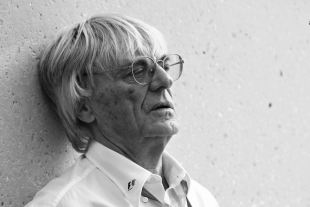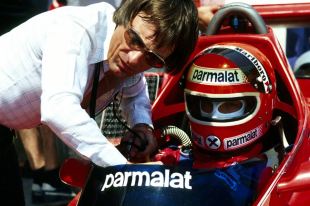
- News:
-
Ecclestone keen to see Mosley return to FIA
- Feature:
-
Bernie Ecclestone timeline
- Feature:
-
Ecclestone on F1 and its future
- Drivers:
- Bernie Ecclestone
It was at the 1993 South African Grand Prix, if I remember correctly, that I was amongst a small group of journalists invited to dinner with Bernie Ecclestone. It was such a rare privilege, we naturally thought he would have earth-shattering news to impart. Perhaps he was going to announce his retirement from business, that he would be stepping down from the bridge of HMS Formula One and relinquishing command.
"After all," said one of our number sagely," he's got to retire sometime. He is 63 this year and nothing lasts for ever!" Given that Ecclestone has just turned 80, looks fitter and more active than ever he did, and still has his foot flat-out on the throttle pedal of F1's money making machine, I think we can safely say that prediction was a little wide of the mark.
Attention to detail, the capacity to think through every problem to a logical and pragmatic solution and the patience to play the long game are all integral elements which go to make up the character of this fascinating individual. He was a motorcycle and car racer, motor dealer, property developer and sometimes a very astute gambler. But basically, beneath all the billionaire gloss, he is a motor racing old hand.
Motorcycle and F1 world champion John Surtees once told me a fascinating story of being taken by his father Jack to buy motorcycle parts from the enterprising young Ecclestone who'd set up stall in his mother's kitchen. Apparently Bernie later showed some interest in becoming some sort of industrial chemist, a sort of motor racing Guy Fawkes as some of his old mates have described it. But it never happened, although legend has it that, during a spell working at a local gasworks in south London, he was so busy with his wheeling and dealing on the side that he failed to perform a routine check on a filter, causing a wide drop in supply pressure over half of Kent.
Bernie's interest in motorcycles led him to compete during the early 1950s in a 500cc F3 Cooper-Norton while still trading cars on the side. I first met Bernie in the spring of 1972 when I was a junior staffer on Motoring News[italics] still cutting my teeth on F2 reporting. I was instructed to make an appointment with the new owner of the Brabham F1 team and it was arranged that I should turn up one morning at Bernie's south London business headquarters in Bexleyheath.
To have described Bernie's emporium as a car sales showroom would be technically correct. In those days most car showrooms were rather grotty, oil-stained establishments, but this was something else again. Yet his stock was immaculately presented, tyre sidewalls neatly buffed and with drip trays under every sump, although I doubt there would have been any likelihood of one drop of oil falling on the spotless floor. Apart from anything else, it wouldn't have dared.
On the motor racing front, Bernie struck up a close relationship with Stuart Lewis-Evans, the young Kentish driver who would laer join the Vanwall F1 team alongside Stirling Moss and Tony Brooks. After Connaught Engineering went out of business and auctioned off its assets in 1957, Ecclestone bought a couple of cars and entered them in the 1957/58 Tasman Series where they were driven by Lewis-Evans and Ivor Bueb. Bernie had plans to field Stuart in an F1 Cooper for the 1959 season, but that all ended when the young Englishman suffered fatal burns at Casablanca in the final race of the '58 championship.
Bernie dropped from the racing scene for much of the1960s before returning as manager to the brilliant Jochen Rindt only for tragedy to intervene again when the brilliant Austrian was killed practising for the 1970 Italian GP at Monza. "He was a great guy and one of the best drivers, maybe the very best," he told me quietly at this year's British GP.
In 1971 he bought the Brabham team, the first step towards establishing the Formula One Constructors' Association as the most important power base within the sport. This would eventually become a foundation stone of Bernie's current enterprise Formula One Management which is one powerful corner of the triangle linking it to the FIA and the competing F1 teams.
But he was always a racer. Tough with Brabham's brilliant chief designer Gordon Murray, but he respected him and approved of his 'on the edge engineering' which was probably best encapsulated by the Brabham 'fan car.' As the years rolled by he may have ostensibly changed from a team owner to the sport's all-powerful commercial rights holder, but he was still a racer. He relished living on the edge, always aiming that the next deal he cut would be the best, most profitable and successful. Competition is still the air that filled his lungs on a daily basis.
Yet he also knew when it was best to make a tactical retreat in order to emerge victorious in the longer term. After the 'fan car' won the 1978 Swedish GP in the hands of Niki Lauda, there was an outcry from Brabham's rivals. Bernie therefore sensibly withdrew the car on the spot and it never raced again. The solidarity of the F1 Constructors' Association, his emergent power base on the long journey to becoming the most powerful man in the sport, was far more important to him that short-term success on the circuit.

Niki Lauda, who drove for him during 1978 and the first part of 1979, remembered that he was basically hard but fair. Tough to nail down to a contract, but totally reliable once you'd finally reached an agreement, no matter how painful or protracted a process that might be. "If you have a disagreement with him, he's not one to bear a grudge," says Lauda. "Once it's sorted, he moves onto the next thing. He's not the sort of person to dwell on things."
When it comes to dealing with the competing teams on a commercial basis, Ecclestone is tough and unrelenting. By guaranteeing the competitors just sufficiently large a share of the supposed $1billion annual income generated by the F1 commercial rights, he maitains a tricky sense of equilibrium and balance. The teams would like more, but the only strength they have collectively is the power of gentle persuasion. That is sometimes enough, sometimes not. Overwhelmingly, he likes to keep people guessing.
In 2005 he pulled off the deal of his life by selling 75 per cent of his F1 empire to CVC Capital Partners for a figure reckoned by some analysts to be in the region of £450m - and some regard that as a conservative estimate!
Bernie has played a blinder.

